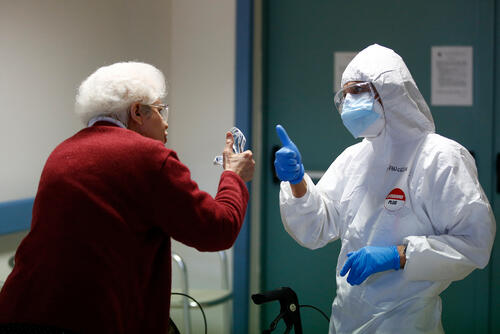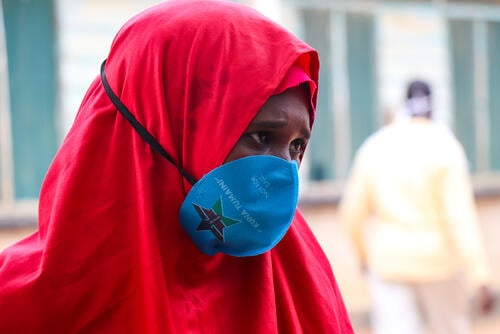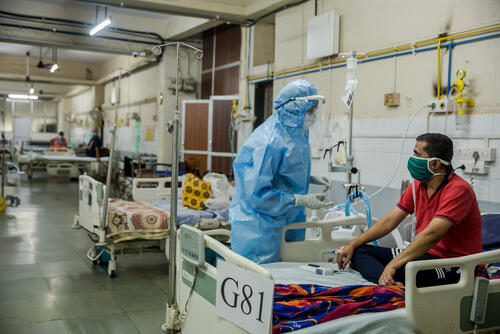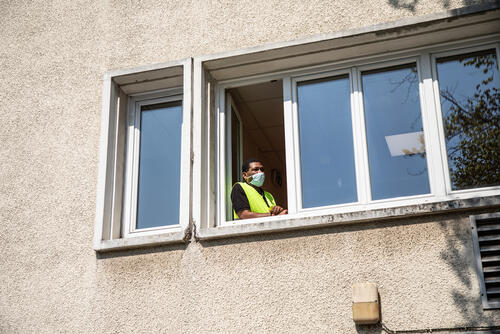MSF teams are racing to respond to the COVID-19 pandemic in the more than 70 countries in which we run programmes, while opening projects in new countries as they become pandemic hotspots.
Our COVID-19 response focuses on three main priorities:
- supporting health authorities to provide care for patients with COVID-19;
- protecting people who are vulnerable and at risk;
- and keeping essential medical services running.
Across our projects, MSF teams have been improving infection prevention and control measures to protect patients and staff and prevent further spread of the new coronavirus. It is absolutely crucial to protect health workers and patients both in COVID-19 care centres and in all other centres providing vital health services, to prevent health facilities from amplifying the pandemic or being forced to close their doors.
Health systems worldwide are urgently in need of personal protective equipment (PPE) so that essential medical services can stay open. The global shortage of PPE is indicative of the reality for health workers in most countries where we work, who face shortages of crucial items such as masks and aprons, and medical tools such as tests.
Having access to protective equipment, to COVID-19 tests, to oxygen and to drugs for supportive care, becomes more and more urgent as COVID-19 spreads in countries with little access to these tools.
Providing care for patients with COVID-19
In Europe and the US, which are currently the epicentres of the pandemic, MSF’s response focuses on improving care for the most vulnerable and at risk, such as elderly people in care homes, homeless people and migrants living in precarious circumstances, where mortality rates have sometimes reached extraordinary and shocking levels.
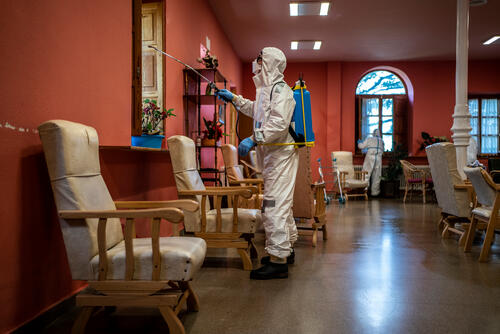
MSF teams are also providing care to vulnerable communities in other places, such as in São Paulo, Brazil where we provide medical consultations and help to detect people with COVID-19 amongst homeless people, migrants, refugees, drug users and the elderly, referring patients in more serious conditions to hospitals.
In Spain, Italy, Belgium and France – all currently hotspots of the pandemic – we are also supporting several hospitals which have been overwhelmed by the number of patients with COVID-19. Depending on the specific needs, our support has ranged from providing advice and training on infection control and prevention methods, to setting up wards for patients recovering from COVID-19 and for patients with moderate symptoms of the disease.
We are caring for patients in dedicated COVID-19 facilities in Burkina Faso, Democratic Republic of Congo (DRC), Cameroon, Côte d’Ivoire, Mali and Pakistan, and are preparing dedicated COVID-19 facilities in Kenya, Lebanon, Niger, Philippines, Senegal, Syria and Yemen, among others. These facilities will care for patients with moderate to severe forms of COVID-19, including those who suffer from acute respiratory problems.
MSF is also sending an oxygen production unit to Burkina Faso, which will be able to produce oxygen in large quantities, for several dozens of patients at the same time. Patients with severe COVID-19 symptoms often suffer from hypoxia (low oxygen levels in body tissue) and need extra oxygen. Where there is little intensive care capacity, a key challenge is to provide patients with sufficient oxygen without the use of invasive techniques.
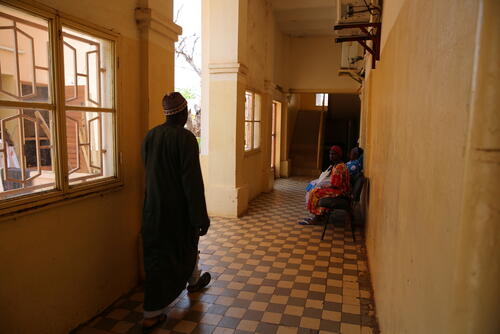
In most countries where we have programmes, such as in Colombia, Iraq, and Nigeria, we have been opening dedicated wards inside health facilities to help separate COVID-19 patients from non-COVID-19 patients and to extend hospitals’ capacity to provide care.
Similar activities are being carried out around the world. In the Haitian capital, Port-au-Prince, MSF has re-configured an existing emergency care centre to isolate and refer patients suspected to have COVID-19. In the Nduta refugee camp in Tanzania, where we are the main health provider for 73,000 Burundian refugees, we are building triage and isolation areas in health clinics and in the main MSF hospital where patients with suspected COVID-19 will be referred.
In Bangladesh, where nearly a million Rohingya refugees live in sprawling camps across Cox’s Bazaar district, we have built dedicated COVID-19 wards and isolation rooms in our field hospitals in different locations. The ongoing work will reach capacity for 300 beds.
Providing people with the capacity to protect themselves, and reduce transmission
Worldwide, the response to COVID-19 has relied heavily on largescale lockdowns of the population and physical distancing measures, with the aim of reducing transmission and to prevent health systems from becoming overwhelmed.
However, for people dependent on daily activities for their survival, such as day labourers, and those living in precarious or overcrowded settings, self-isolation and lockdowns are not realistic. In some places, hundreds of thousands, sometimes even millions, of people live in such conditions, without any social safety net. It is crucial to provide people with the means and tools they need to be able to protect themselves and help protect others.
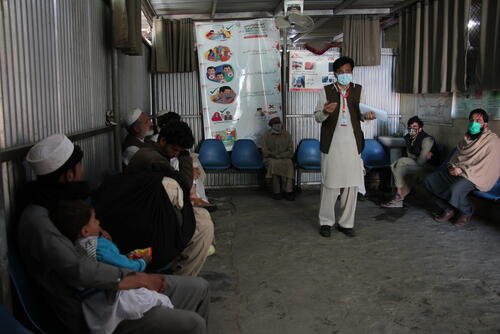
To help people protect themselves, MSF teams are running health promotion activities in practically all our projects, so that people understand the steps they can take to reduce the chances of contracting COVID-19 and to stop the further spread of the coronavirus. Where possible, we are distributing soap and setting up water points so people can regularly wash their hands.
These measures, and additional assistance such as the provision of reusable cloth masks, are even more crucial for people at risk of developing serious complications, including elderly people and those with other diseases, such as diabetes, hypertension, cancer, HIV or tuberculosis (TB).
For example, in Uzbekistan, our health promotion activities include specially tailored messaging on TB and COVID-19 for TB patients and their families. In South Africa, MSF has re-purposed existing staff from all four of our projects to our COVID-19 response. They are now working to limit the spread of the infection through contact tracing (both in-person and over the telephone) and the development and dissemination of health promotion materials.
Teams are also assisting vulnerable asylum seekers and elderly homeless people, particularly in containment sites where homeless people have been forcibly moved by authorities, to mitigate the impact of the national 21-day lockdown.
In Liberia, MSF teams are distributing soap, while in the Malian capital of Bamako, where there have already been confirmed cases, and in camps from Syria to Mexico, and Nigeria to Greece we are setting up water points for hand-washing and clean drinking water.
In Burkina Faso, Cote d’Ivoire, Mali, Niger and South Africa, we have started producing cloth masks for use in the community. The cloth masks can be made locally and, while they are not the same as those required by medical staff, they can help prevent transmission of the virus if used appropriately and so long as handwashing and physical distancing are observed as much as possible in the local circumstances.
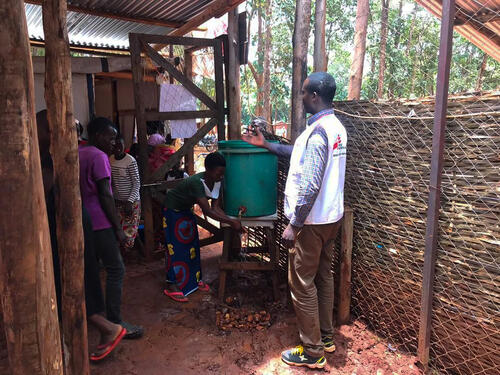
Keeping essential services running
Faced with suddenly having to treat huge numbers of new patients, countries with already fragile health systems, that have fewer health staff and weaker infrastructure, can quickly collapse under the pressure and the impact can be disastrous. If medical care were to falter, then common childhood killers, like measles, malaria and diarrhoea, would go untreated.
Other essential services we provide, such as sexual and reproductive care, emergency room services, maternity and surgical wards, and treatment of patients who have HIV or TB, would go unmet. This would have a terrible impact on the people we serve and would surely increase the number of deaths in the community.
In the hundreds of health facilities MSF works in around the world, our teams have been rolling out infection control measures and re-organising services to prevent transmission. For example, consultations have been reformatted to maintain safe distances between patients and hospitalisation wards have been redesigned to allow enough space between each bed. Health facilities now have separate patient pathways to divert those with suspected COVID-19 away from other patients.
In Niger, rather than having large numbers of people visiting health centres to be checked for possible malaria, MSF community health workers go into communities to help provide this service. In Kenya, MSF has adapted the way we care for people living with HIV by giving antiretroviral drugs to patients in three-month batches, so they can come to health centres less frequently. In South Africa, our teams are ensuring HIV/TB patients get medicine refills delivered straight to their homes.
Across the world, from Cameroon and DRC, to El Salvador, Nigeria, Sudan, or Yemen, MSF teams are training and supporting local health authorities on infection prevention and control methods, and the detection and triage of patients with COVID-19, to prevent health facilities from becoming amplifiers of the pandemic.
Continuing our medical activities in areas already facing massive health needs is an absolute priority for MSF.Albert Viñas, MSF emergency coordinator for Cameroon
Unfortunately, a few projects have been suspended as a result of new restrictions linked to COVID-19, such as MSF’s paediatric surgical programme in Liberia, which received some of the most critical cases of children needing surgery. The project was suspended as a result of travel restrictions imposed to limit the spread of COVID-19, making it impossible to replace the paediatric surgeon who left at the end of March.
We have also suspended activities that are not vital, such as elective surgery, and re-organised others to reduce the risks for patients and staff. For example, in Pakistan, we have put on hold our cutaneous leishmaniasis treatment services as a temporary measure to avoid the spread of COVID-19. In Jordan, MSF’s reconstructive surgery hospital for war-wounded in the Middle East, continues to care for 170 patients already present, but have stopped new admissions for surgery for the time being.
But despite these constraints, MSF teams in all countries of operation are striving to find ways to keep as much as possible of our life-saving medical work running, while adapting to the multiple and serious challenges that the COVID-19 pandemic is presenting.



